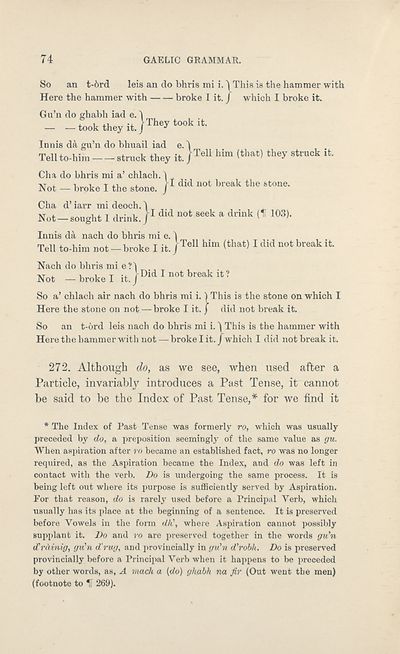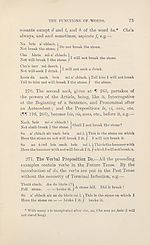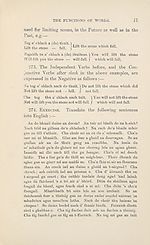Download files
Complete book:
Individual page:
Thumbnail gallery: Grid view | List view

74
GAELIC GRAMMAR.
So an t-6rd leis an do bhris mi i. This is the hammer with
Here the hammer with broke I it. / which I broke it.
Gu’n do ghabh iad e.
— — took they it.
| They took it.
Innis da gu’n do bhuail iad e.
Tell to-him struck they it.
|Tell him (that) they struck it.
Cha do bhris mi a’ chlach.l
Not — broke 1 the stone. /
did not break the stone.
Cha d’ iarr mi deoch.
Not — sought I drink.
}
I did not seek a drink (II 103).
Innis da nach do bhris mi e.
Tell to-him not — broke I it.
Tell him (that) I did not break it.
Nach do bhris mi e?!
Not — broke I it. J
Did I not break it ?
So a’ chlach air nach do bhris mi i.) This is the stone on which I
Here the stone on not — broke I it.) did not break it.
So an t-6rd leis nach do bhris mi i. I This is the hammer with
Here the hammer with not — broke I it. /which I did not break it.
272. Although do, as we see, when used after a
Particle, invariably introduces a Past Tense, it cannot
be said to be the Index of Past Tense,* for we find it
* The Index of Past Tense was formerly ro, which was usually
preceded by do, a preposition seemingly of the same value as ffu.
When aspiration after ro became an established fact, ro was no longer
required, as the Aspiration became the Index, and do was left in
contact with the verb. Do is undergoing the same process. It is
being left out where its purpose is sufficiently served by Aspiration.
For that reason, do is rarely used before a Principal Verb, which
usually has its place at the beginning of a sentence. It is preserved
before Vowels in the form d/i’, where Aspiration cannot possibly
supplant it. Do and ro are preserved together in the words gu’n
tCrdinig, gu’n d'rug, and provincially in gu’n d’robh. Do is preserved
provincially before a Principal Verb when it happens to be preceded
by other words, as, A much a (do) ghabh na fir (Out went the men)
(footnote to H 269).
GAELIC GRAMMAR.
So an t-6rd leis an do bhris mi i. This is the hammer with
Here the hammer with broke I it. / which I broke it.
Gu’n do ghabh iad e.
— — took they it.
| They took it.
Innis da gu’n do bhuail iad e.
Tell to-him struck they it.
|Tell him (that) they struck it.
Cha do bhris mi a’ chlach.l
Not — broke 1 the stone. /
did not break the stone.
Cha d’ iarr mi deoch.
Not — sought I drink.
}
I did not seek a drink (II 103).
Innis da nach do bhris mi e.
Tell to-him not — broke I it.
Tell him (that) I did not break it.
Nach do bhris mi e?!
Not — broke I it. J
Did I not break it ?
So a’ chlach air nach do bhris mi i.) This is the stone on which I
Here the stone on not — broke I it.) did not break it.
So an t-6rd leis nach do bhris mi i. I This is the hammer with
Here the hammer with not — broke I it. /which I did not break it.
272. Although do, as we see, when used after a
Particle, invariably introduces a Past Tense, it cannot
be said to be the Index of Past Tense,* for we find it
* The Index of Past Tense was formerly ro, which was usually
preceded by do, a preposition seemingly of the same value as ffu.
When aspiration after ro became an established fact, ro was no longer
required, as the Aspiration became the Index, and do was left in
contact with the verb. Do is undergoing the same process. It is
being left out where its purpose is sufficiently served by Aspiration.
For that reason, do is rarely used before a Principal Verb, which
usually has its place at the beginning of a sentence. It is preserved
before Vowels in the form d/i’, where Aspiration cannot possibly
supplant it. Do and ro are preserved together in the words gu’n
tCrdinig, gu’n d'rug, and provincially in gu’n d’robh. Do is preserved
provincially before a Principal Verb when it happens to be preceded
by other words, as, A much a (do) ghabh na fir (Out went the men)
(footnote to H 269).
Set display mode to:
![]() Universal Viewer |
Universal Viewer | ![]() Mirador |
Large image | Transcription
Mirador |
Large image | Transcription
| An Comunn Gàidhealach > An Comunn Gàidhealach Publications > Scottish Gaelic as a specific subject > (78) |
|---|
| Permanent URL | https://digital.nls.uk/125955953 |
|---|
| Description | This contains items published by An Comunn, which are not specifically Mòd-related. It includes journals, annual reports and corporate documents, policy statements, educational resources and published plays and literature. It is arranged alphabetically by title. |
|---|
| Description | A collection of over 400 items published by An Comunn Gàidhealach, the organisation which promotes Gaelic language and culture and organises the Royal National Mòd. Dating from 1891 up to the present day, the collection includes journals and newspapers, annual reports, educational materials, national Mòd programmes, published Mòd literature and music. |
|---|---|
| Additional NLS resources: |
|

